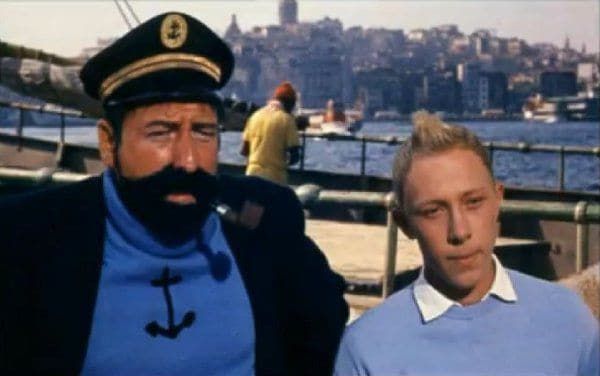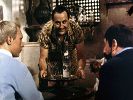Eye For Film >> Movies >> Tintin And The Mystery Of The Golden Fleece (1961) Film Review

As Spielberg’s much-anticipated motion-capture behemoth approaches, now seems as good a time as any to look back at previous big and small-screen incarnations of the iconic boy reporter (who never seemed to get bogged down in trivial mundanities such as filing stories to deadline and talking to his editor).
Anyone for whom the stentorian declamation: "Herge’s Adventures Of Tintin!" sparks a Proustian remembrance of rainy mornings in the summer hols may already have investigated Anchor Bay’s DVD reissue of the animated cartoon shorts. But of far greater rarity and curiosity value is this BFI reissue, one of a brace of live-action outings made in France during the early Sixties.

On the evidence of Tintin And The Golden Fleece, no one could make a serious case for them as children’s film classics or hidden gems in the vast treasure house of Cinema Francaise. But this one at least rings very true to the spirit of the original comic strips – and offers a glimpse of an era whose cinematic style and general worldview seem to come from an age far more bygone than a mere 50 years ago.
Herge gave approval for his characters to be used, but a new story from outside of the original canon was created by Barret and Forlani, two industry veterans. It still has everything you’d expect from a Tintin adventure - hidden treasure, exotic locations, colourful villains, high-speed chases and even a Latin American backstory that offers echoes of one of my personal favourites from the originals, The Broken Ear.
It begins at Captain Haddock’s residence, Marlinspike Hall, where the retired seadog receives a letter informing him that an old shipmate, Themistocles Paparanic, has died and left him his ship, The Golden Fleece, as an inheritance. His friend and neighbour Tintin (presumably on a sabbatical from whichever paper it is he actually works for) agrees to accompany him to Istanbul to take possession of the vessel.
She turns out to be a classic old tub (realised by the production design team in minutely rusty detail that I’m tempted to think Jeunet and Caro took notice of when making The City Of Lost Children) with nothing on board but a cargo of moth-eaten carpets. Despite this, a shipping magnate (Demetrios Myrat) offers them a small fortune to take it off their hands. Tempted but suspicious, the duo ask for time to consider the offer. But on their first trip into Istanbul’s Old City they find themselves followed by mysterious gunmen...
After that, events precede at enough of a pace to avoid the viewer thinking too much about the plot holes. Tintin and Haddock’s attempts to track down Paparanic’s crew from the South American rebellion caper, and the fortune in gold brought out from it, take them to Athens, the mountains of Greece and the Meteora monasteries (also used to stunning effect in For Your Eyes Only, the only half-way decent Roger Moore Bond adventure) before a land, sea and air climax in the Ionian islands.
Mild peril is never far away, and most of the old gang– Professor Calculus, The Thompson Twins et al - make an appearance. The violence of the books is toned down somewhat – murder is often attempted, but never actually committed – and the main focus is on knockabout physical comedy. Together with the lush colour and jaunty soundtrack this means that despite the international settings the film is squarely in the territory of French Whimsy, so expertly and extensively charted by Monsieur Tati.
Naurally, it’s nowhere near being in the Old Master’s league but it has a similarly infectious sense of fun and innocence. The racial stereotyping isn’t nearly as pronounced as in the books – rather the cosmopolitan bustle of the great port cities and the idiosyncratic customs of rural Greece have the same sense of intrigued wonder at a then-faraway world as the early Bond films (particularly From Russia With Love, though in this one the director stops short of a gipsy catfight).
The somewhat uneven performances and machine-translator dubbed dialogue add to the sense of ramshackle charm. Talbot – a Belgian PE teacher spotted for his resemblance to Tintin and introduced to Herge, who recommended him for the films – is no Jean-Paul Belmondo in the acting stakes and his oft-deployed fighting prowess isn’t quite in the Van Damme league either – but he’s the spitting image of the bright and eager cub hack, right down to the blue jumper and brown plus-fours, with a quiff that’s a feat of gravity-defying engineering equal to any Weta workshop special effect.
Georges Wilson, a veritable General De Gaulle of French acting, whose career began in the Fifties and stretched through to Mesrine: Public Enemy Number One, brings out Haddock’s rumbustious physicality and heart of somewhat-tarnished gold (the dubbing artist does a good job on the not-quite-swearing convoluted curses, too). In fact, another pleasure for cinephiles is playing the “hang on, wasn’t he in...” game, particularly with Bozzuffi (the hitman in The French Connection), who plays the villains’ chief enforcer and Vanel (The Wages Of Fear and To Catch A Thief among many. many others) as the seafarer-turned-priest who provides our heroes with the key to the mystery.
How it’ll play with pre-teens fresh from Transformers 3 is a moot point, but for those of us who lament the lack of badly-dubbed black-and-white French shows on Saturday morning telly these days it should provide a diverting little bonbon before the main feast. And if Spielberg and Jackson’s CGI Snowy is as cute as this one’s little scene-stealer then, by blistering blue barnacles, I’ll eat my captain’s hat.
Reviewed on: 05 Oct 2011

















